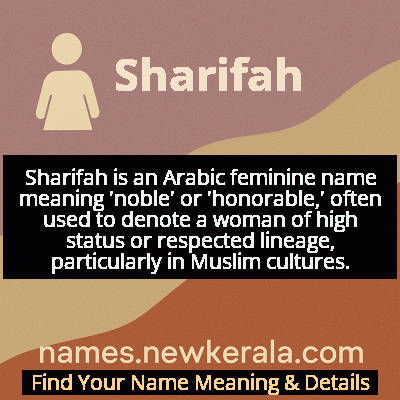Sharifah Name Meaning & Details
Origin, Popularity, Numerology Analysis & Name Meaning of Sharifah
Discover the origin, meaning, and cultural significance of the name SHARIFAH. Delve into its historical roots and explore the lasting impact it has had on communities and traditions.
Name
Sharifah
Gender
Female
Origin
Muslim
Lucky Number
7
Meaning of the Name - Sharifah
Sharifah is an Arabic feminine name meaning 'noble' or 'honorable,' often used to denote a woman of high status or respected lineage, particularly in Muslim cultures.
Sharifah - Complete Numerology Analysis
Your Numerology Number
Based on Pythagorean Numerology System
Ruling Planet
Neptune (Ketu)
Positive Nature
Intuitive, analytical, spiritual, and inquisitive.
Negative Traits
Secretive, reserved, aloof, and can be overly critical.
Lucky Colours
Green, yellow.
Lucky Days
Monday.
Lucky Stones
Cat’s eye, moonstone.
Harmony Numbers
1, 5, 6.
Best Suited Professions
Scientists, researchers, spiritual leaders, detectives.
What People Like About You
Depth of knowledge, analytical skills, spirituality.
Famous People Named Sharifah
Sharifah Aini
Singer and Actress
Malaysian singing legend with career spanning five decades, numerous awards including Anugerah Industri Muzik lifetime achievement award
Sharifah Sofia
Royalty and Educator
Princess of Johor who established educational foundations and promotes women's education in Malaysia
Sharifah Haslinda
Journalist
Award-winning broadcast journalist known for in-depth political reporting and documentary filmmaking
Sharifah Mazlina
Explorer
First Asian woman to reach both North and South Poles, recognized by Malaysian Book of Records
Name Variations & International Equivalents
Click on blue names to explore their detailed meanings. Gray names with will be available soon.
Cultural & Historical Significance
The name's cultural resonance is particularly strong in Malay archipelago societies, where it symbolizes the integration of Islamic values with local cultural traditions. Many royal families in Malaysia and Indonesia include Sharifahs who have contributed significantly to education, arts, and social development. The name also reflects the matrilineal aspects of Islamic nobility in some cultures, where women bearing the Sharifah title could inherit and transmit noble status to their children. This dual significance - both religious and cultural - makes Sharifah a name that connects individual identity to broader historical narratives of Islamic civilization and its spread across diverse geographical regions.
Extended Personality Analysis
Women named Sharifah are typically associated with a natural elegance and composed demeanor that reflects their name's noble connotations. They often possess strong intuitive abilities and emotional intelligence, enabling them to navigate complex social situations with grace and wisdom. Their leadership style tends to be collaborative rather than authoritarian, drawing people toward common goals through inspiration rather than coercion. Many Sharifahs demonstrate remarkable balance between traditional values and modern thinking, making them effective bridges between generations and cultural contexts. They typically exhibit deep loyalty to family and community while maintaining clear personal boundaries and principles.
In interpersonal relationships, Sharifahs are often described as warm yet reserved, approachable yet maintaining an air of dignity that commands respect. They tend to be excellent listeners who offer thoughtful advice when sought, but rarely impose their opinions on others. Their strength often manifests as quiet resilience rather than overt assertiveness, allowing them to overcome challenges with patience and strategic thinking. Many develop strong interests in education, community service, or creative expression, finding fulfillment in activities that benefit others while allowing personal growth. The combination of inner confidence and outward humility typically makes Sharifahs respected figures in their social and professional circles, often serving as moral compasses for those around them.
Modern Usage & Popularity
In contemporary naming practices, Sharifah maintains strong popularity across Muslim communities while adapting to modern sensibilities. The name ranks consistently high in Malaysia, where it appears in the top 50 female names according to recent national statistics. In Indonesia, variations of Sharifah remain popular among families seeking names that honor Islamic heritage while sounding melodious in the local linguistic context. Among Arab communities, the name continues to be chosen for both its traditional significance and elegant pronunciation. Interestingly, modern usage shows increased popularity in non-Arab Muslim countries like Nigeria, Pakistan, and Bangladesh, indicating the name's growing pan-Islamic appeal. In Western diaspora communities, Sharifah serves as a distinctive yet culturally authentic choice that helps maintain religious and cultural identity. Recent social media trends have also contributed to the name's visibility, with several influential Muslim content creators and professionals named Sharifah bringing contemporary relevance to this traditional name. The digital age has also seen creative spelling variations emerge, though the classical Arabic form remains most popular among religiously observant families.
Symbolic & Spiritual Meanings
Sharifah symbolizes the living connection between individual identity and collective heritage in Islamic culture. Metaphorically, it represents the idea that true nobility manifests through character and service rather than mere ancestry. The name carries symbolic weight as a bridge between the sacred and mundane, suggesting that everyday actions can reflect divine principles when guided by moral excellence. In Sufi traditions, the concept of 'sharaf' (nobility) relates to spiritual refinement and closeness to God, making Sharifah symbolic of soul's journey toward enlightenment. The name also embodies the Islamic principle that the most honored before God are those with the most piety (Quran 49:13), transforming the concept of nobility from hereditary privilege to earned virtue through righteous conduct.
Symbolically, Sharifah represents the ideal of womanhood in Islamic tradition - strong in faith, compassionate in action, wise in counsel, and dignified in bearing. It evokes images of historical figures like Fatimah al-Zahra, daughter of Prophet Muhammad, who exemplified these qualities. The name also carries connotations of cultural preservation and transmission, symbolizing the role women play in maintaining religious and ethical values across generations. In modern contexts, Sharifah has come to symbolize the successful integration of Islamic identity with contemporary life, representing Muslim women who honor tradition while making significant contributions to modern society in diverse fields from science and education to arts and public service.

